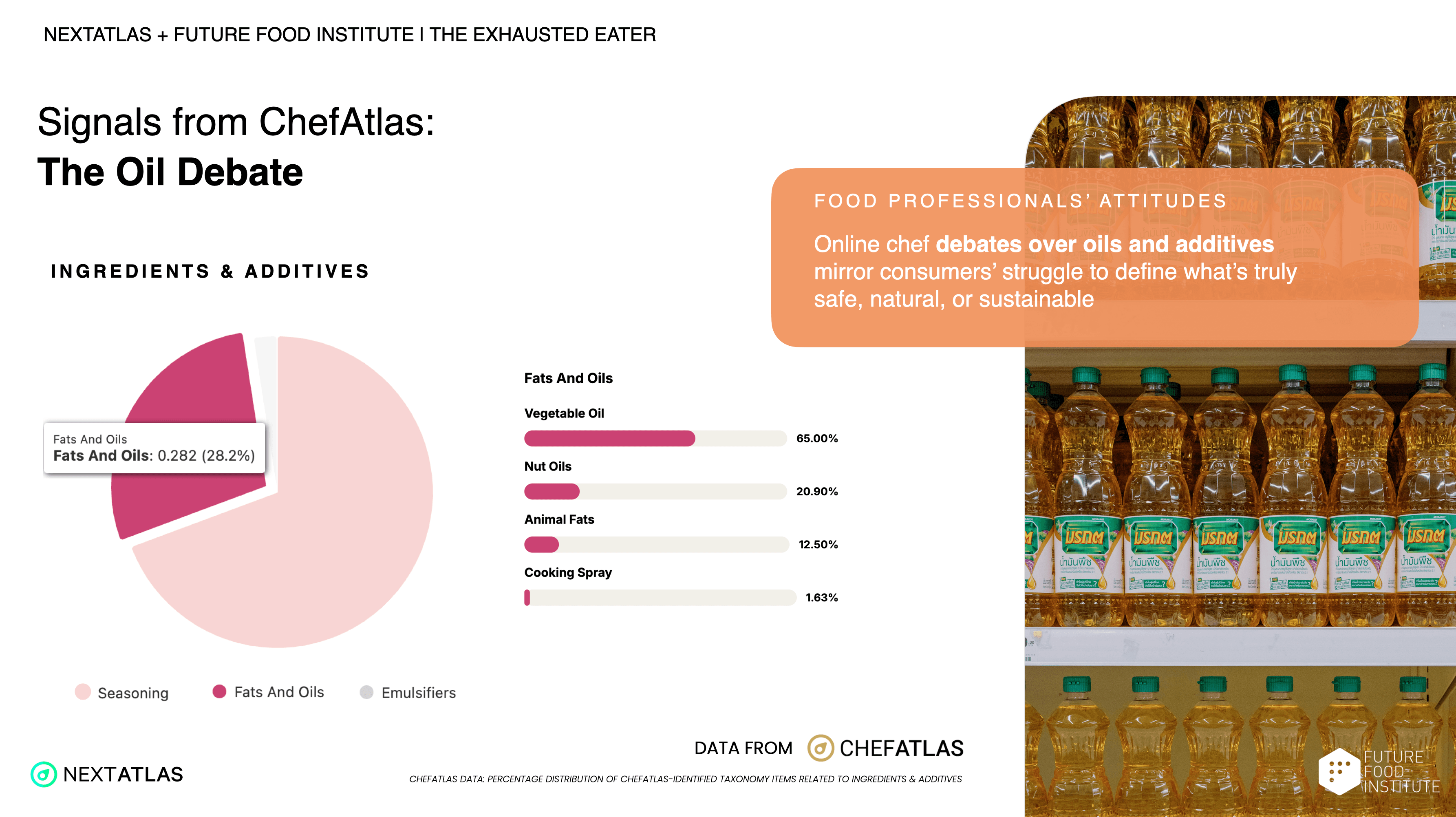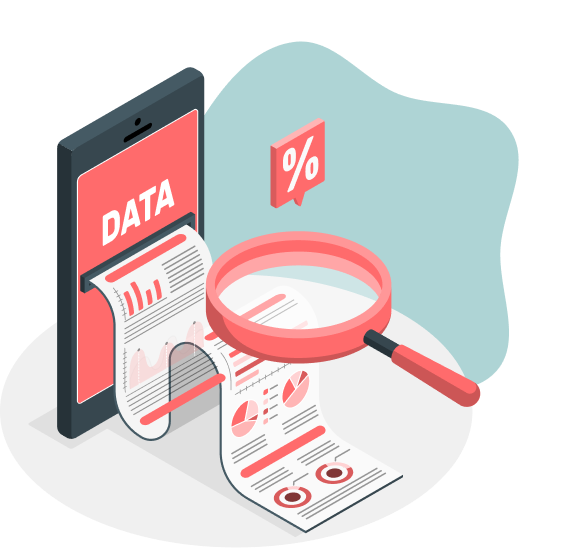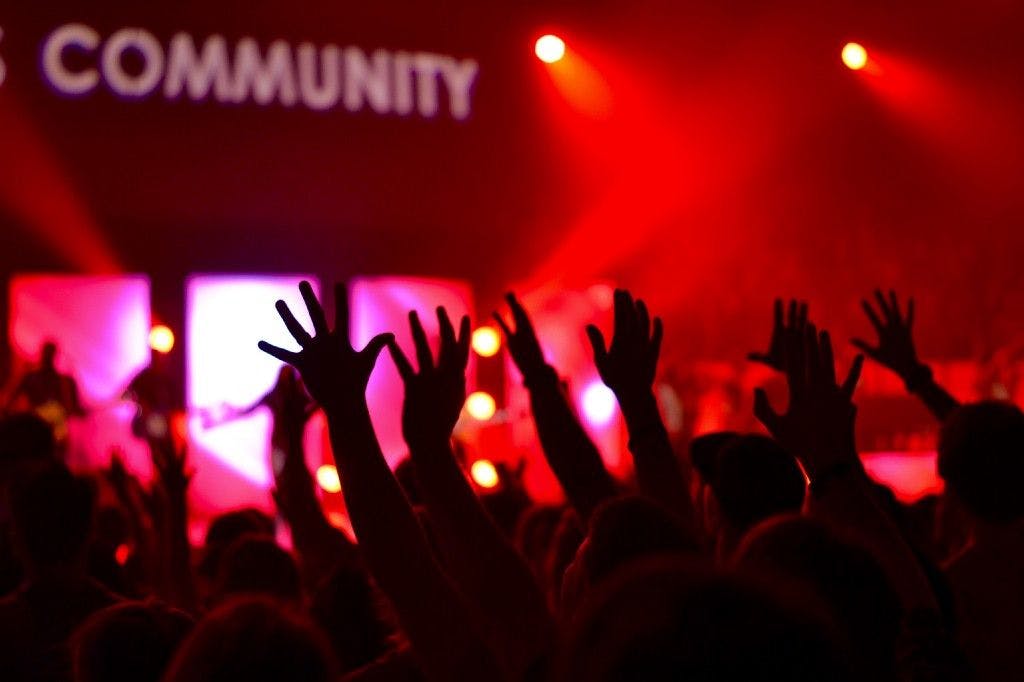The Exhausted Eater: How Decision Fatigue is Reshaping F&B
FOOD & BEVERAGE
In our latest webinar with Future Food Institute, we explored the rise of the “Exhausted Eater.” From decision fatigue to trust-driven choices, discover how shifting appetites are reshaping the food landscape — and what brands can do to bring clarity back to the table.

Food has always been about more than sustenance. It is ritual, culture, memory, and pleasure. Yet as our CEO and co-founder, Luca Morena, reminded us in our recent webinar with Sara Roversi, Founder and President of the Future Food Institute, food today also carries an invisible weight. In a conversation that wove together global data and lived experience, the two explored what we have come to call "the exhausted eater": a new reality where the very act of deciding what to eat is becoming overwhelming.
The Current Decision Fatigue
Sara opened with a reflection on the paradox of our era: “We live in a paradox where the more choices we have, the less free we feel. Eating has become an emotionally charged act, caught between abundance and anxiety.” This sentiment is borne out by the numbers. According to our analysis, conversations around decision fatigue in food and beverage have grown by more than 114% over the past year, making it one of the most pressing cultural shifts shaping appetite today.

Decision Fatigue in Food & Beverage is skyrocketing according to Nextatlas data
The Weight of Choice
The causes of this exhaustion are many. Consumers face the backlash against ultra-processed foods, rising climate guilt, the proliferation of conflicting diets, and the endless churn of algorithm-fueled fads. What should be the simplest of decisions — what to have for dinner — now feels like a moral minefield. As Luca put it, “Appetite is no longer just about hunger; it has become about navigating complexity. The dinner table mirrors the contradictions of our time: we are caught between wanting pleasure and fearing the risks hidden behind every ingredient.”
Nowhere is this more visible than among Millennials and Gen Z. Raised in a digital ecosystem of wellness influencers, delivery apps, and social feeds that constantly redefine what “healthy” means, these generations are more vulnerable to overload. Eating becomes, in Sara’s words, “a cognitive and moral balancing act — every plate carries questions of purity, control, and trust.” It is no surprise that supplements and functional products, once marketed as performance enhancers, are now embraced as sources of reassurance, ways to feel anchored in a sea of conflicting advice.
Reflected by Chefs and in Menus
The data gathered through ChefAtlas highlights how even professional chefs are not immune to this climate of uncertainty. Online debates over oils and additives reveal the same struggle that consumers face in defining what is safe, natural, or sustainable. The conversations are charged not just with technical detail but with cultural unease, echoing the wider food community’s search for clarity.
In parallel, NextMenu shows how this desire for reassurance translates directly to restaurant culture. Extra Virgin Olive Oil, for example, is gaining remarkable momentum across France, Germany, and the UK, emerging as a trusted anchor — a familiar, reassuring ingredient in an otherwise confusing food environment. As Luca noted, “What we see in menus is the reflection of a deep cultural need. EVOO isn’t just an ingredient, it has become a symbol of safety, purity, and continuity.”

Data from ChefAtlas on the fats and oils section under the ingredients and additives category. ChefAtlas is a direct pipeline to the world's most innovative chefs, analysing thousands of posts from food professionals. to discover tomorrow's ingredients and techniques straight from culinary masterminds.
Craving Reassurance
Trust, then, has become the new currency in food. Labels, sourcing information, and ingredient lists are no longer fine print. They are decisive factors in whether a product feels suitable to eat. Our data shows verifiable claims in food and beverage growing by 92%, while debates around synthetic and addictive ingredients expand rapidly. Sara pointed to the political dimension of this shift: “When even local governments legislate around food dyes and additives, it shows that trust in food is no longer a niche consumer concern. It is a collective anxiety that cuts across demographics and ideologies.”
Transparency, however, is only part of the story. Consumers are also looking for cultural anchors, for foods and cuisines that feel familiar enough to be safe while leaving room for discovery. ChefAtlas data indicates that regional cuisines are increasingly filling this role, providing both reassurance and authenticity. In the restaurant space, NextMenu highlights how simple, traditional dishes like cacio e pepe can carry more trust than products weighed down with long labels. Meanwhile, the rise of everyday global comforts such as Indian curry shows how even once-exotic flavours are being reframed as sources of stability in daily diets.
The Psychology of Trust
Yet in this atmosphere of overload, the opportunity for innovation is clear. Consumers do not want more choice — they want clarity. They do not want endless options — they want guidance. Brands, retailers, and restaurants that position themselves as navigators rather than noise-makers can transform exhaustion into comfort. Sara summarised this shift powerfully: “The future of food is not about more, it is about enough. Enough transparency to feel safe, enough simplicity to feel confident, and enough trust to make food a source of joy again.”
As the joint report concludes, trust is no longer a background value. It is the growth driver of the next era of food culture. From supermarkets curating capsule pantries, to restaurants anchoring menus around familiar flavours, to governments legislating transparency into law, the path forward is one of simplification and reassurance. The exhausted eater does not need to be overwhelmed. With the right tools, signals, and foresight, brands can step in to restore food as a source of comfort, pleasure, and confidence.
At Nextatlas, through tools in our TasteOS like ChefAtlas and NextMenu, we remain committed to detecting these early cultural signals and translating them into actionable foresight. By helping brands cut through noise and offer clarity, we believe we can transform the narrative of exhaustion into one of empowerment.

A special thanks to our webinar guest, Sara Roversi, for her contribution
Trend lines, data, and information described in this article emerge from the ongoing analysis performed by Nextatlas on its global observation pool made of innovators, early adopters, industry insiders expressing their views on Twitter, Instagram, and Reddit.
To learn more about our AI, discover Nextatlas Methodology here
Related articles:
Italy
Torino - Via Stampatori 4, 10122(Operational headquarter)+39 011/0864065VAT number and registration number at the Registro delle Imprese di Cagliari: 03428550929 paid share capital € 167.740,00 — © 2024 iCoolhunt SpA.




